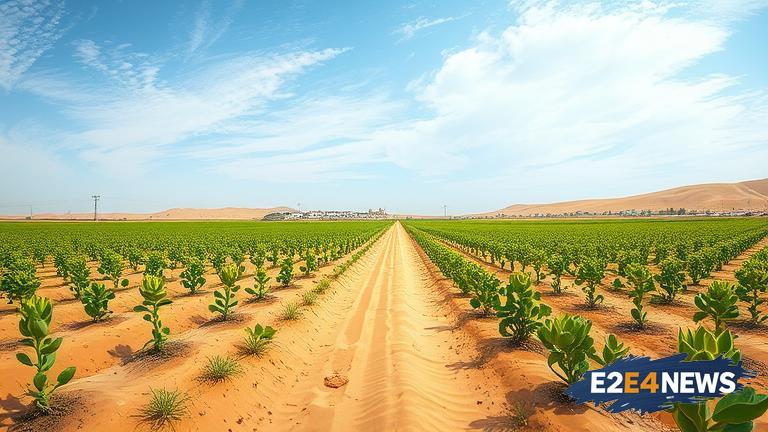Israel, a country known for its innovative approach to agriculture, has been at the forefront of developing and implementing advanced desert farming techniques. The country’s agricultural sector has been working tirelessly to increase crop yields and reduce water consumption in the arid desert regions. One of the key techniques being used is precision agriculture, which involves the use of advanced technologies such as drones, satellites, and sensors to monitor and control crop growth. This approach allows farmers to optimize water and fertilizer usage, resulting in higher yields and reduced waste. Another technique being employed is hydroponics, a method of growing plants in a nutrient-rich solution rather than soil. This approach has been shown to increase crop yields by up to 30% while reducing water consumption by up to 90%. Israel’s desert farming initiatives have also been focused on developing new crop varieties that are more resilient to drought and heat stress. Scientists have been working to identify and breed crop varieties that have a higher tolerance to these conditions, allowing them to thrive in the harsh desert environment. The use of advanced irrigation systems has also been a key factor in the success of Israel’s desert farming initiatives. These systems use advanced technologies such as drip irrigation and sprinkler systems to deliver water directly to the roots of the plants, reducing evaporation and runoff. In addition to these techniques, Israel’s agricultural sector has also been investing in research and development to improve the overall efficiency of desert farming. This includes the development of new technologies such as vertical farming, which involves growing crops in vertically stacked layers. Vertical farming has been shown to increase crop yields by up to 50% while reducing water consumption by up to 95%. The Israeli government has also been providing support to farmers through initiatives such as subsidies and training programs. These programs aim to help farmers adopt new technologies and techniques, and to provide them with the skills and knowledge needed to succeed in the desert farming sector. The impact of Israel’s desert farming initiatives has been significant, with crop yields increasing by up to 25% in some areas. The country’s agricultural sector has also seen a significant reduction in water consumption, with some farms reducing their water usage by up to 75%. The success of Israel’s desert farming initiatives has also had a positive impact on the country’s economy, with the agricultural sector contributing significantly to the country’s GDP. The initiatives have also created new job opportunities in the agricultural sector, with many farmers and agricultural workers benefiting from the increased demand for desert-grown crops. Furthermore, Israel’s desert farming initiatives have also had a positive impact on the environment, with the reduction in water consumption and the use of more efficient irrigation systems helping to conserve this precious resource. The country’s agricultural sector has also been working to reduce its carbon footprint, with many farms adopting renewable energy sources such as solar and wind power. Overall, Israel’s desert farming initiatives have been a resounding success, and the country is now being seen as a leader in the field of desert agriculture. The techniques and technologies being developed in Israel are being adopted by other countries around the world, and the country’s agricultural sector is expected to continue to play a major role in the global food system. As the global population continues to grow, the need for innovative and sustainable agricultural practices will become increasingly important, and Israel’s desert farming initiatives are likely to play a key role in meeting this challenge. The country’s commitment to reducing its environmental impact and increasing crop yields has made it a model for other countries to follow, and its agricultural sector is expected to continue to thrive in the years to come. With its strong focus on research and development, Israel is well-placed to continue to innovate and improve its desert farming techniques, and the country’s agricultural sector is likely to remain at the forefront of this field for many years to come.
